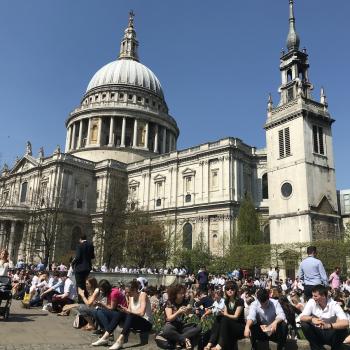The age of martyrdom is far from over. Living in the West we may feel relatively insulated from such things but our brothers and sisters around the world wake up this morning to the knowledge that their lives are at risk because of their faith. We can feel powerless to help. But help we can, if nothing else by our prayers, by being informed, and by supporting the work of organizations set up to help the oppressed.
As a child I remember being inspired by the work of Open Doors with Brother Andrew behind the iron curtain. So much more than a Bible smuggling group, their website today continues to keep us up to date with persecution happening right now around the world. You can also follow them on twitter.
There is also a secular American government mandated organization – United States Commission on international Religious Freedom that tracks and reports all types of religious persecution. Their reports make difficult reading. So for example, they say in their report on Nigeria which is for the first time this year one of 13 countries listed as of particular concern.:
The response of the government of Nigeria to persistent religious freedom violations and violent sectarian and communal conflicts along religious lines has been inadequate and ineffectual. Years of inaction by Nigeria‘s federal, state and local governments has created a climate of impunity, resulting in thousands of deaths.
In March-April 2009, the Commission traveled to Nigeria to assess religious freedom conditions in the country. Concerns include an ongoing series of violent communal and sectarian conflicts along religious lines; the expansion of sharia (Islamic law) into the criminal codes of several northern Nigerian states; and discrimination against minority communities of Christians and Muslims. Therefore, the Commission, for the first time, is recommending that Nigeria be designated as a country of particular concern, or CPC, for tolerating systematic, ongoing, and egregious violations of religious freedom.* manipulating voting results during campaigning for local government councils. The report found, among other things, that that the state government failed to act on intelligence from the state security services about violence being planned . . .
In November 2008, the city of Jos, Plateau state, experienced several days of intense sectarian and communal violence. At least several hundred Muslims and Christians were killed, with some independent groups estimating the death toll closer to 3,000 . . .
In February 2009, Muslim-Christian clashes in Bauchi state resulted in at least 11 deaths, although some reports indicated as many as 20 people were killed, with 1,500 individuals displaced. In addition, fourteen churches, eight parsonages, one mosque and approximately 150 homes and businesses were burned and/or destroyed . . .
Indeed, since 1999, a disturbingly large number of Nigerians—12,000, if not more—have been killed in sectarian and communal attacks and reprisals between Muslims and Christians . . .
The government of Nigeria has done little, if anything, to address sectarian and communal violence. There have been no serious efforts to investigate or prosecute the perpetrators of the numerous killings and other crimes that have occurred in Bauchi, Jos, and the other incidents noted above. There are reports of specific instances of failures to heed warning signs of violence on the part of various government leaders, and failures on the part of federal police to respond effectively and appropriately—at times, if at all—to violence once it has erupted . . .
Put simply, the Nigerian Government has permitted religious violence and other severe violations of the freedom of religion to occur with impunity . . . READ MORE
There are a further 12 countries on a “watch list” where concerns about religious freedom are thought to be less severe. For the first time this year India was placed on that list. Here is some extracts which explain why:
The Commission views India as a critically important country in terms of religious freedom, given its experience with democracy following its colonial past. India is the world’s largest democracy, is home to a multitude of religious communities that have historically coexisted peacefully, occupies a key geopolitical position, and enjoys increasing stature on the global stage even as it faces violent acts of terrorism on its soil. Nonetheless, several incidents of communal violence have occurred in various parts of the country, resulting in many deaths and mass displacements, particularly of members of the Christian and Muslim minorities, including major incidents against Christian communities within the 2008-2009 reporting period.
Because the government’s response at the state and local levels has been found to be largely inadequate and the national government has failed to take effective measures to ensure the rights of religious minorities in several states, the Commission decided to place India on its Watch List for 2009 . . .
The murder of an influential Hindu leader in August 2008 sparked a prolonged and violent campaign targeting Christians in the state of Orissa. Over several weeks, at least 40 individuals were killed, the vast majority of whom were Christians, church properties and thousands of homes were destroyed, and an estimated 60,000 or more Christians fled their homes, seeking refuge in the jungle or in government relief camps. The inadequate police response failed to quell the violence, and early central government intervention had little impact. Mass arrests following the Orissa violence did not translate into the actual filing of cases . . .
By March 2009, several state and central police units remained in Kandhamal, and at least 3,000 individuals were still in government camps, reportedly because of their inability to return to their homes unless they “reconvert” to Hinduism. Numerous press and NCM reports document widespread forced conversions of Christians to Hinduism in villages and relief camps in Orissa, following the Fall 2008 attacks. The Orissa state VHP chief declared on September 12 that the death of Swami Saraswati was an impetus to halt Christian conversions in Orissa. About two weeks later, a month-long series of so-called “reconversion” ceremonies and processions of the Swami’s ashes throughout Kandhamal was announced. There was no immediate police or state government reaction. Insecurity and the threat of harassment, property destruction, and/or additional violence allegedly have caused many Christians to partake in “reconversion” ceremonies. According to the NCM report, even retired high-ranking officials were “threatened with every sort of retaliation if they did not forthwith change their religion and embrace Hinduism.” READ MORE












